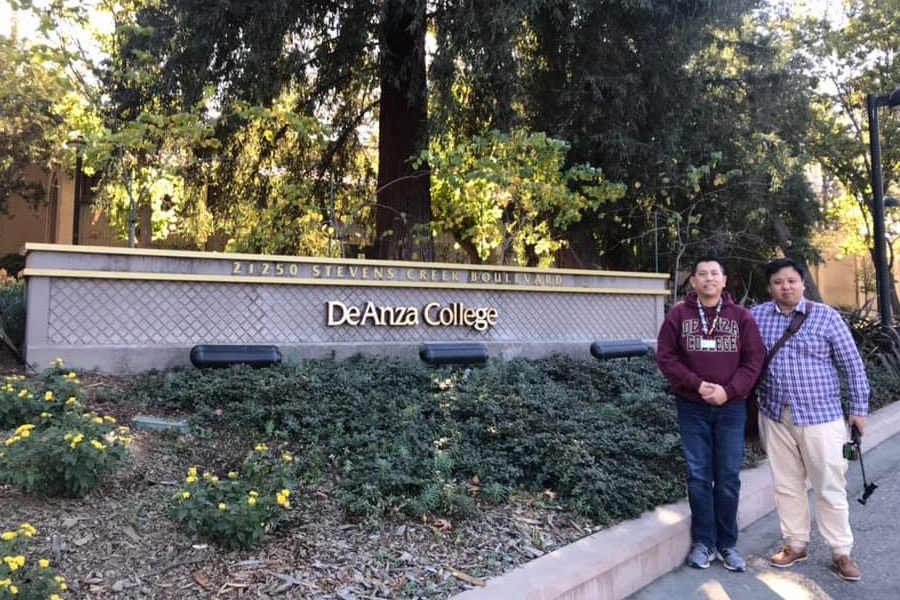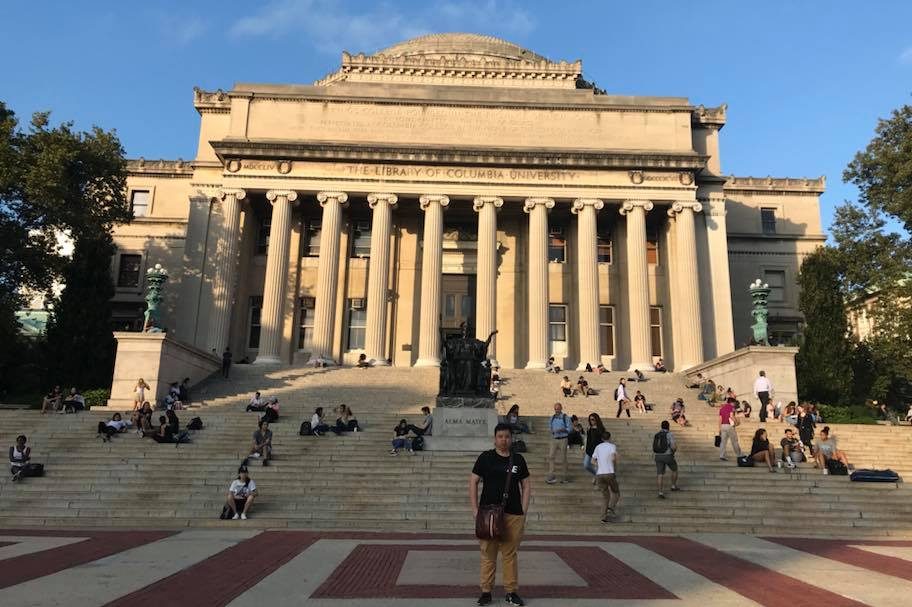Study in the USA from Malaysia
The United States is the world’s largest economy and is has the most Fortune 500 companies in the world like Amazon, Apple, Alphabet, Meta Platforms and so many more. It also dominates the world’s university rankings consistently. The U.S. is the most popular study abroad destination welcoming 1,503,649 international students in 2023.
We are the top study in the USA agency in Malaysia.

Fast Facts in Numbers
1,000,000+
International Students in 2020
3,982
Degree-granting postsecondary institutions
398
Nobel Prize Laureates
Study in the USA with UG Overseas Education
As Malaysia’s leading USA study consultancy, UG Overseas Education is dedicated to guiding students toward successful careers through higher education in the United States. Whether you’re a high school graduate, a bachelor degree graduate, or part of the American Degree Transfer Program (ADTP), our experienced team will ensure that you’re well-equipped to enter top industries such as technology, engineering, healthcare, cybersecurity, and biomedical engineering.
Why Study in the USA?
The United States remains the most popular study abroad destination for international students, offering:
- World-Class Education: Home to prestigious institutions like Harvard, MIT, Stanford, and more.
- Cutting-Edge Research Opportunities: Many U.S. universities are at the forefront of innovation and technological advancements.
- Diverse Campus Environments: Experience a rich mix of cultures and ideas in one of the most diverse countries.
- Career Opportunities: Graduating from a U.S. institution opens doors to global job markets, especially in fields like technology, business, and healthcare.
In addition to its strong industry connections, the U.S. education system has other key strengths that make it the ideal destination for international students:
Practical Learning & Internships: The USA emphasizes hands-on learning through internships, co-op programs, and partnerships with industry leaders, giving students real-world experience before they graduate.
Global Networking Opportunities: Studying in the U.S. means building connections with students and faculty from all over the world, as well as professionals from top industries.
Entrepreneurial Ecosystem: Many U.S. universities provide startup incubators and support for student entrepreneurs, making it a top destination for those interested in launching their own ventures.
Innovative Research: The U.S. is a global leader in research and development, with universities often collaborating on large-scale, world-changing projects in science, medicine, and engineering.
How UG Can Help You Study in the USA
Our Comprehensive Services Include:
1. Personalized University Selection
Based on your academic background, career goals, and interests, we help you choose the best-fit U.S. universities—whether you’re aiming for a public university, private liberal arts college, or community college. We ensure that your chosen institution aligns with your aspirations in fields like technology, business, healthcare, or engineering.
2. Application Assistance
Our experts guide you through crafting the perfect application, including personal statements, essays, and letters of recommendation. We provide detailed feedback and ensure that your application stands out to admissions officers. From application forms to meeting deadlines, we have you covered.
3. Scholarship Guidance
Studying in the U.S. doesn’t have to break the bank. We help you explore scholarships options, ensuring that you can focus on your education without worrying about costs. Our team identifies the best opportunities to reduce the financial burden of your U.S. education.
4. Visa Application Support
The visa process can be daunting, but we’re here to help. We prepare you for the visa interview, ensure that all necessary documents are in order, and guide you through each step of the visa application process. Our goal is to make sure your journey to the U.S. is smooth and hassle-free.
5. Pre-Departure and Post-Arrival Support
From navigating urban, suburban, or rural campus settings to adjusting to life in a new country, we provide pre-departure guidance to prepare you for the cultural and academic differences in the U.S. Once you arrive, we offer continued support to ensure a smooth transition into student life, including help with housing, transportation, and academic adjustments.
Professional Development and Industry Readiness
At UG Overseas Education, we don’t just focus on getting you into your dream university—we prioritize your professional development to ensure you are ready to succeed in the global job market. Our services include:
6. Industry Certification Guidance
We provide you with the resources and support to earn industry-recognized certifications in fields like technology, engineering, and cybersecurity, ensuring that you’re job-ready upon graduation. These certifications, such as those offered by Cisco, AWS, Google, Microsoft, and more, will help you bridge any skills gap and enhance your employability in the USA and beyond.

Are you an American Degree Transfer Program (ADP/ADTP) Student? We can assist you!
Why Apply with UG?
Applying to U.S. colleges is a lengthy and complicated process compared to applying to universities in the United Kingdom and Australia. Let our professional consultants guide you through the application and visa processes by contacting us now. We are one of the top agencies in Malaysia and Singapore for student placements to colleges in the United States. We have also assisted students globally to study in the United States.
At UG Overseas Education, we don’t just help you apply to universities—we prepare you for a career in the USA. Our all-encompassing approach focuses on academic success, professional growth, and long-term career readiness. With our extensive network of partnerships and expertise, we position you to thrive in the U.S. job market by providing:
- Expert University Guidance tailored to your academic and professional aspirations.
- Comprehensive Application and Visa Support to ensure a smooth and successful process.
- Professional Development Resources to help you bridge the skills gap and stand out in the competitive job market.
- Career Preparation through workshops and guidance, ensuring you’re ready to pursue internships and job opportunities.
Do read our resources, blogs and FAQs to understand more about studying in the United States.
Resources
Discover the top 5 reasons why the U.S. is the most popular study destination among international students.
Community Colleges are a great and affordable route to experience U.S. education and transfer to top U.S. universities.
Discover some of the most popular U.S. universities international students choose as well as our partner schools.
Frequently Asked Questions
General
Most bachelor degree programs are 4 years in duration and most associate degree programs are 2 years. Duration also varies from the number of credits you do each semester, e.g. the more credits you take each semester and/or the more sessions you take each year could reduce the duration of your studies.
In the United States, the terms “college” and “university” are often used interchangeably. Colleges do offer undergraduate degrees. An example is Dartmouth College, a private Ivy League research university in Hanover, New Hampshire.
Freshman refers to year 1 students, Sophomore refers to year 2 students, Junior refers to year 3 students and Senior refers to year 4 students.
Public universities are primarily state funded and usually have larger campuses, larger student population and larger class sizes compared to private universities.
Admissions
Extremely competitive! Acceptance rates range between 4-7%. Getting straight As or 4.0 GPA in your high school does guarantee you admissions. You are highly recommended to apply to safety schools (colleges that you are more likely to be accepted).
it means that your application is assessed in a holistic manner. Besides reviewing your academic performance, other components like the college essays, recommendation letters, standardized tests, English test scores and resume will also be assessed too.
Most U.S. colleges do not require standardized tests like SAT and ACT but it is highly recommended especially if you are applying to competitive colleges or even trying to get a high scholarship quantum. Do check on the admission requirements page of the college that you are applying to find out if standardized tests are required.
If you are applying for competitive U.S. colleges, you should start preparing for your application at least 12 months in advance (the earlier the better). The reason is that you would need to spend time preparing for your standardized test (if required), college essay and getting letters of recommendation.
If you are applying for Early Action (EA) or Early Decision (ED), you should submit your application by November 1 and receive the outcome in December.
If you are applying for Regular Decision (RD), you should submit your application by January 1 and receive the outcome in March/April.
If you have missed the deadline, do not panic, many U.S. colleges have rolling admissions and flexible deadlines. Contact us to find out more.
A-Level, IB and AP students usually get transferable credits off classes like calculus, lower level sciences like physics, chemistry, biology and/or history, economics.
However transferring other non U.S. college credits, e.g. Diploma, to a U.S. college is not a straightforward process and may require your transcripts to be sent to a credential evaluation companies such as ECE, WES for their “course-by-course” evaluation. This also does not mean that your credits are transferable. To manage expectations of students, we usually get them mentally prepared that they will receive no transferable credits and if they do get it, consider it a bonus.
The U.S. education system is very different from education systems in the UK, Australia, Singapore and Malaysia as it requires students to take general education classes.
We highly recommend students to consider attending community colleges in the U.S. and transfer to a U.S. university over doing a non U.S. diploma if your intention is to study in the U.S. and your budget is limited or if you are unable to qualify for the first year of undergraduate studies. Check out our article on Community Colleges in the U.S.
All programs will start in the Fall (August/September). There also many universities that also offer Spring (January) intakes.
Community Colleges offer 4 intakes a year – Fall and Spring intakes and Winter and Spring sessions.
Finances
In-state tuition generally only applies to residents attending public colleges in the same state of their residency, e.g. California residents will pay in-state tuition to Californian public schools like UCLA and Santa Monica College.
Most international students would pay out-of-state tuition for public colleges. In-state tuition does NOT apply to private colleges.
“Cost of Attendance” refers to the estimated annual cost of attending college. It is comprised of the estimated annual tuition, room and board, insurance, books and supplies and other expenses.
As there are close to 4,000 degree-granting institutions in the U.S., tuition varies among colleges. Generally we advise students that the tuition for:
Community colleges: USD 10,000 – 12,000 a year.
Public Universities:
USD 18,000 – 40,000 a year
Private Universities:
USD 35,000 – 60,000 a year
Living cost depends on the cities and also an individual’s lifestyle. Cities like New York, NY, Boston, MA, Los Angeles, CA, San Francisco, CA, Miami, FL, Chicago, IL and Seattle, WA are amongst the most expensive cities to live in the U.S. and we estimate an annual living cost of USD 23,000 based on student experiences.
Mid-sized cities like Tempe, AZ, Salt Lake City, UT, Orlando, FL and Las Vegas, NV are more affordable and we estimate an annual living cost of USD 18,000 based on student experiences.
It is often nearly impossible for a new incoming international student to receive financial aid. However, it is possible for international students to receive scholarships. Contact us to find out which schools offer scholarships.
Housing and Dining
Most colleges require freshman students (year 1) to stay on campus with a meal plan. This is a great way to quickly adapt to the college environment and not worry about not having meals.
Many U.S. colleges require freshman students (Year 1) to stay in on-campus housing with a meal plan. Essentially, room refers to on-campus housing and board refers to the meal plans.
Students living in on-campus housing would typically pay for a semester of meal plans where receive food credits and would be deducted each time they consume food in the dining areas on campus.
In most colleges in the U.S., it is common that 2 to 3 students live in the same room, especially for lower-level undergraduate students. It is a great way to learn to live with different cultures and also look out for each other. Single rooms are usually for upper-level students, graduate students, mature students, residential advisors and/or disabled students that require mobility assistance.
If you are looking for colleges that allows freshman to live off campus, you may wish to consider a city campuses or contact us for more information.
Employment
According to the U.S. Citizenship and Immigration Services:
F-1 students may not work off-campus during the first academic year, but may accept on-campus employment subject to certain conditions and restrictions. After the first academic year, F-1 students may engage in three types of off-campus employment:
- Curricular Practical Training (CPT)
- Optional Practical Training (OPT) (pre-completion or post-completion)
- Science, Technology, Engineering, and Mathematics (STEM) Optional Practical Training Extension (OPT)
Curricular Practical Training is a type of off-campus work permission for F-1 international students who are currently pursuing a course of study in the United States and want to gain experience in their fields of study. CPT is not available after a student completes a degree program.
If an F-1 student uses 12 months or more of full-time CPT at the same degree level , the student forfeits Optional Practical Training eligibility. (Use of full-time CPT in a prior degree at the same level would be included in the 12 month calculation.)
Yes, only if you have been offered employment related to your studies.
Optional Practical Training (OPT) is temporary employment that is directly related to an F-1 student’s major area of study. Eligible students can apply to receive up to 12 months of OPT employment authorization before completing their academic studies (pre-completion) and/or after completing their academic studies (post-completion). However, all periods of pre-completion OPT will be deducted from the available period of post-completion OPT.
Certain F-1 students who receive science, technology, engineering, and mathematics (STEM) degrees may apply for a 24-month extension of their post-completion optional practical training (OPT).


